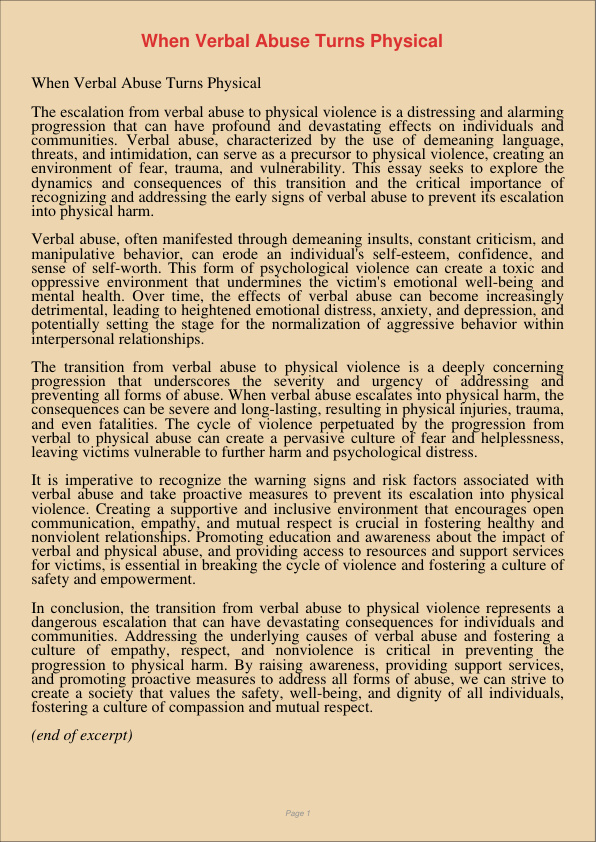When Verbal Abuse Turns Physical
Dec 31, 2023
verbal abuse turns physical
Journalism & Communication
Marketing
When Verbal Abuse Turns Physical
The escalation from verbal abuse to physical violence is a distressing and alarming progression that can have profound and devastating effects on individuals and communities. Verbal abuse, characterized by the use of demeaning language, threats, and intimidation, can serve as a precursor to physical violence, creating an environment of fear, trauma, and vulnerability. This essay seeks to explore the dynamics and consequences of this transition and the critical importance of recognizing and addressing the early signs of verbal abuse to prevent its escalation into physical harm.
Verbal abuse, often manifested through demeaning insults, constant criticism, and manipulative behavior, can erode an individual’s self-esteem, confidence, and sense of self-worth. This form of psychological violence can create a toxic and oppressive environment that undermines the victim’s emotional well-being and mental health. Over time, the effects of verbal abuse can become increasingly detrimental, leading to heightened emotional distress, anxiety, and depression, and potentially setting the stage for the normalization of aggressive behavior within interpersonal relationships.
The transition from verbal abuse to physical violence is a deeply concerning progression that underscores the severity and urgency of addressing and preventing all forms of abuse. When verbal abuse escalates into physical harm, the consequences can be severe and long-lasting, resulting in physical injuries, trauma, and even fatalities. The cycle of violence perpetuated by the progression from verbal to physical abuse can create a pervasive culture of fear and helplessness, leaving victims vulnerable to further harm and psychological distress.
It is imperative to recognize the warning signs and risk factors associated with verbal abuse and take proactive measures to prevent its escalation into physical violence. Creating a supportive and inclusive environment that encourages open communication, empathy, and mutual respect is crucial in fostering healthy and nonviolent relationships. Promoting education and awareness about the impact of verbal and physical abuse, and providing access to resources and support services for victims, is essential in breaking the cycle of violence and fostering a culture of safety and empowerment.
In conclusion, the transition from verbal abuse to physical violence represents a dangerous escalation that can have devastating consequences for individuals and communities. Addressing the underlying causes of verbal abuse and fostering a culture of empathy, respect, and nonviolence is critical in preventing the progression to physical harm. By raising awareness, providing support services, and promoting proactive measures to address all forms of abuse, we can strive to create a society that values the safety, well-being, and dignity of all individuals, fostering a culture of compassion and mutual respect.
